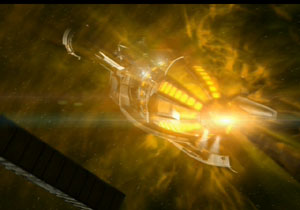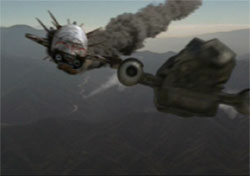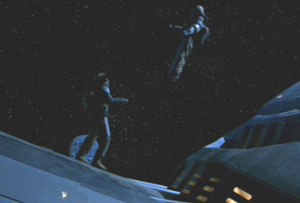|
You may have heard of this one. Sci-fi TV show, fourteen whole episodes, three of which didn't air, the rest of which aired in an order that was not at all what one might call the correct one, which went on to achieve success as a DVD boxed set anyway. It aired, when it aired, on Fox. Yes, it is to laugh. Why, one must ask, do television producers pitch potential programming to Fox, given their long and celebrated history of dropping the axe on shows that have failed to become a runaway hit by the occasion of the first commercial break? Free cocaine and hookers? Something along such lines? I have no clue. Firefly executive producer Tim Minear went on to produce Wonderfalls and Drive, also on Fox, which lasted four and three episodes, respectively. Perhaps the man needs to get a clue, or three, or just learn to live without the hookers. It isn't worth it. 
Fox advertised the pilot episode for months in advance, a curious move seeing as they didn't show it, and didn't intend to. The pilot, they felt, took too long to get going and wasn't happy enough. Such things as setup and establishing, pacing, gradual character development, and various sundry things of that nature were disdained by the Fox execs, who preferred to just get you into the middle of things straightaway and not muck about. This they then did by starting the show with the second episode, or de facto substitute pilot, which got you right into the middle of things, left you feeling like you must have missed something, generally confused you, and, for most people, sufficiently alienated you to the point of not coming back, a choice which the network made nearly effortless by the decision to stick the series in a Friday night slot, when most of the key demographic would be out with friends or on dates-or, well, when the actual key demographic of SF geeks would be busy rolling dice in an attempt to create some friends, or trying to sneak out of their parents' basements without being caught by Mom and harangued over what time they intended to return. But-what? I haven't said anything about the show yet? Oh, right. Hang on. Firefly was an odd hit, largely in the sense that it wasn't a hit at all, but then went on to sell truckloads of DVD sets anyway, sort of like The Terminator, only, you know, less so. The cancelled show's rabid fan base bought up the discs like they were going out of style, even though they'd never actually been in style, and made the set a best-seller. It almost goes without saying that sci-fi has always attracted the obsessives, but Firefly fans are generally worse than average by virtue of their smaller numbers, leading to a pronounced sense of elitism and all-around specialness, i.e. "we know something you don't know, and that makes us important." Or "mighty," as they're more likely to say, as it's a quote from the show, and there's nothing a bunch of essentially powerless nerds like better than to envision themselves as the embodiment of their heroes, fearlessly combating the Evil Empire. Add to this the fact that their constant yammering actually persuaded Universal to bankroll a big-screen follow-up, which also wasn't a hit, and you end up with some of the most self-righteous, mutual back-patting geeks in history. When last I looked, this smugdom had resulted in a fan-produced, self-aggrandizing documentary about how Serenity came to be because of their tireless efforts; never mind the writer and director, producers, cast, technicians, artisans, and probably a lawyer or two-you owe the existence of Serenity to the sort of endless campaigning the likes of which might truly have benefited a cause of any importance whatsoever courtesy of...what? I still haven't mentioned the show at all? Right. Sorry. 
So, the show. It's good. It's fun. It's not Star Trek, so thank whatever imaginary friend you worship for that. By the time Trek had lumbered into the late 1980s, whatever charm it once possessed had been replaced by a a cast of walking gimmicks who solved their every problem by plugging some made-up device into another made-up device in an exciting new way that solved the problem of that particular week. Firefly pretty much never talked about the technology. In one memorable instance, its dubious hero solved one of his many problems for that week by shooting a hostage-holding bad guy right in the face. Fuck yeah. That's way more like it. In fiction, at least. Reality would better be served by more gadget-making and fewer face-shootings, but if I was after reality, I wouldn't watching a TV show to start with. That said, the characters are refreshingly closer to reality than most television has to offer, and most SF in particular. This isn't to say that there's no gimmickery going on; Joss Whedon, most known for Buffy the Vampire Slayer and its spin-off Angel, has his own menagerie of stock characters who tend to keep popping up in his work. It just happens to be different than the stock characters we tend to expect, much in the way that Hong Kong cinema seems really exciting when you first get into it until you realize that they're just doing mostly the same things over and over. At the same time, there's a lot of good Hong Kong films, so pointing out repetition of style isn't a condemnation, merely an observation that Whedon's ouvre isn't as unique as many claim it to be. Indeed, the phrase "Joss Whedon's unique vision of the future" seems to pop up with inordinate frequency when this show is mentioned, and it's incorrect. The conflation of western and oriental culture, right down to the linguistic pastiche spoken in the show, had already been done twenty years before by the SF classic Blade Runner, and the Old West influence on science fiction has been almost a staple, ranging from Han Solo in Star Wars to the shitty '80s space western cartoon Bravestarr. Mysterious government conspiracies? Girls with kickass powers and/or mind-reading abilities? Hell, the British ultra-low budget series Blake's 7 was rife with that stuff back in the late '70s. (In fact, Jayne's quip "I was aiming for his head" was stolen straight from a Blake's episode, when that show's amoral antihero wounded a villain he meant to kill.) A rough, hand-held documentary look? They were pretty early on that curve; too bad everyone probably now associates it with the far more successful 24 and Battlestar Galactica series. Everything's been done, and done again, and they're going to do it again. With the sheer quantity of fiction in existence and still being produced, it just can't be helped. 
So why is the show still good? Because, for one thing, it genuinely is fun. To make a comparison to the aforementioned Battlestar Galactica (that being the new one, of course), Firefly actually has peaks and valleys in its emotional tone. Galactica, while a well-written and well-acted show in its own right, has about one mood, which is perpetually flatlining across the bottom of the graph, and after a while, it gets ponderous. Whedon has the wit to realize that without humor and light moments, the sudden tragic ones won't mean nearly as much. The general design of the show, and in particular that of the spacecraft Serenity, have a refreshing realism about them sorely absent from the flying space lounge of the Next Generation Enterprise or the barely-decorated gray, metal rooms that comprise the bulk of the sets for even cheaper televised SF crap. The Serenity actually looks like a spaceship, with elements blended from modern nautical vessels and NASA constructs like Skylab giving us a rare and pleasingly convincing evocation of something that might actually fly, if not fly well. And despite its predecessors, Firefly does have its own recognizable voice and style, and a down-to-earth feel that can ingratiate it to even the passing or non-sci-fi fan. Few shows provide us with the nervous laughter felt when two men squabble over the loyalties of a mutually respected female while both are being tortured, even less frequently do we get stories about space bounty hunters in the service of an examination of existentialism, and rarely if ever does a morally questionable character have an emotional epiphany and then continue with the questionable morals nonetheless. If such instances are sandwiched amongst a larger quantity of things we have seen before, it probably can't be helped, and Firefly does more right than it does wrong. Though the hammer fell prematurely, costing the few who cared the chance to see the show really spread its wings, the big-screen sequel Serenity tied up most of the loose ends, if not all of them, and allowed the show to function as a self-contained mini-series of sorts. While we'll never get to see what heights of drama might've come from a protracted run, we can at least enjoy Firefly for what it was: an amusing, sometimes experimental character drama that never had a single episode revolve around a malfunctioning holodeck. None of this makes the fans any less insufferable, but such are the breaks. -review by Matt Murray
|
|
||||||||